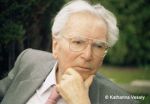“What man actually needs is not a tensionless state but rather the striving and struggling for some goal worthy of him. What he needs is not the discharge of tension at any cost, but the call of a potential meaning waiting to be fulfilled by him.” Victor Emil Frankl (1905 – 1997), Austrian neurologist, psychiatrist and Holocaust survivor, devoted his life to studying, understanding and promoting “meaning.” His famous book, Man’s Search for Meaning, tells the story of how he survived the Holocaust by finding personal meaning in the experience, which gave him the will to live through it. He went on to later establish a new school of existential therapy called logotherapy, based in the premise that man’s underlying motivator in life is a “will to meaning,” even in the most difficult of circumstances. Frankl pointed to research indicating a strong relationship between “meaninglessness” and criminal behaviors, addictions and depression. Without meaning, people fill the void with hedonistic pleasures, power, materialism, hatred, boredom, or neurotic obsessions and compulsions. Some may also strive for Suprameaning, the ultimate meaning in life, a spiritual kind of meaning that depends solely on a greater power outside of personal or external control.

